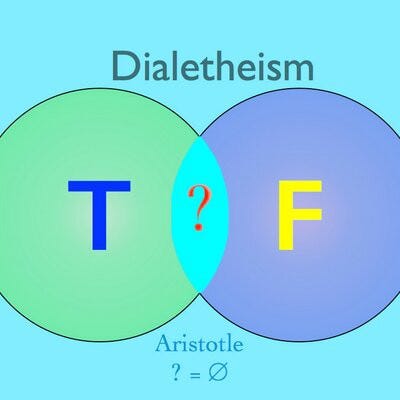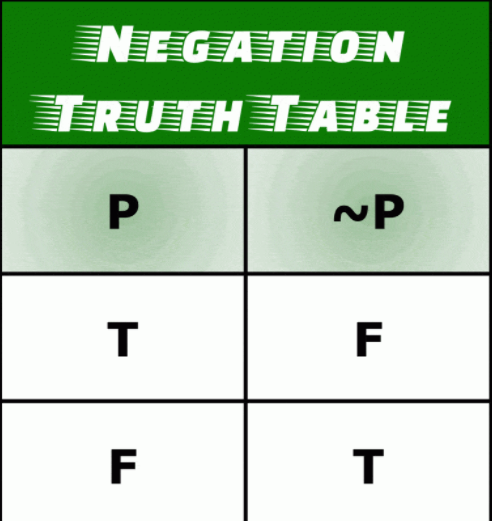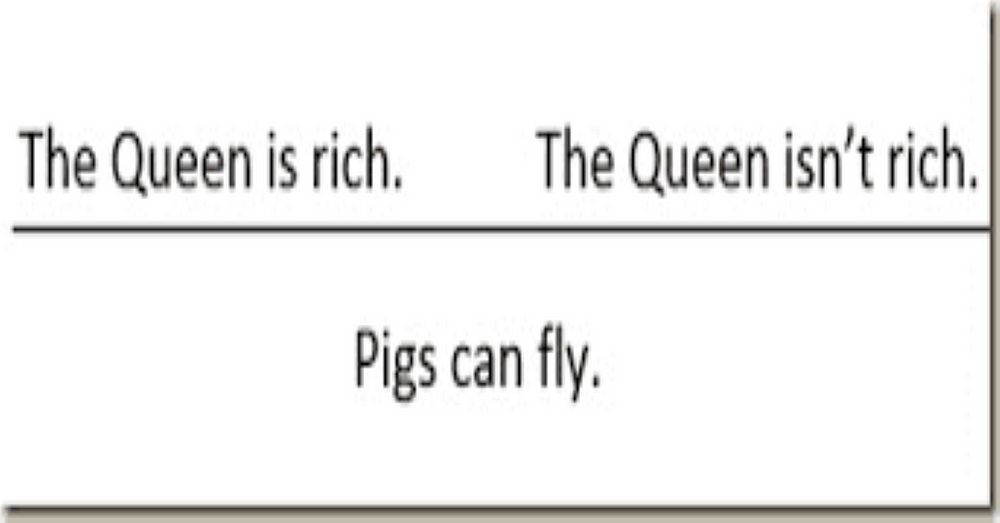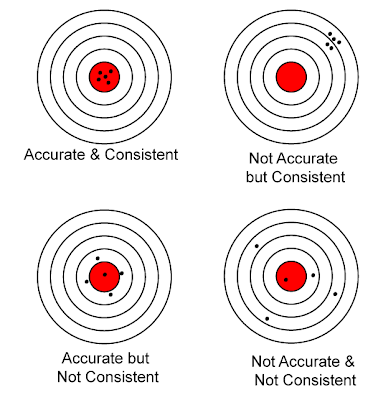Are there “true contradictions” in the world?

The word dialetheism comes from the Greek δι (di- ‘twice’) and ἀλήθεια (alḗtheia ‘truth’). It’s the view that there are some statements which are both true and false. In other words, it’s the view that there can be a true statement whose negation is also true. In the literature, these statements are called “true contradictions” or (to use Graham Priest’s neologism) dialetheia.
The philosopher and logician Graham Priest (1948-) is the main proponent of dialetheism.
Priest is an Australian who now lives in New York. He’s written many books and had numerous articles published in journals of philosophy and logic. Priest is also the Distinguished Professor of Philosophy at the CUNY Graduate Center and an “honorary” professor at the University of Melbourne. He was educated at the University of Cambridge and at the London School of Economics.
Priest also practices karate and tai chi. His interest in Eastern philosophy — particularly Buddhist logic and philosophy (see here) — has strongly influenced his dialetheism.
Dialetheism

Dialetheism isn’t a formal logic. It’s (as Graham Priest himself puts it) “a theory of truth”. And this emphasis leads dialetheists to construct a logic which deals with truth. Or, at the least, with truth as it’s thrown up primarily by various paradoxes in set theory and elsewhere. Indeed Graham Priest himself states that
“the whole point of the dialetheic solution to the semantic paradoxes is to get rid of the distinction between object language and meta-language”.
(Clearly, this is a Tarski-influenced focus on the nature of truth.)
In what follows I question the truth-for-dialetheism issue by asking questions about dialetheism’s relation to (to use Priest’s word) “reality”.
¬Boolean Negation

Firstly, Graham Priest makes the claim that
“[e]ven dialetheists, after all, need to show that they don’t accept 1 = 0”.
On the surface it would seem that if dialetheists don’t — or won’t — accept 1 = 0, then neither must they accept ¬A ∧ A. And this isn’t simply the case because one proposition involves numbers and the equality sign, and the other doesn’t.
Priest clarifies this 1 ≠ 0/¬A ∧ A dichotomy when he tackles Boolean negation.
According to Priest:
“[I]F not-A is compatible with A, then asserting not-A cannot constitute a denial.”
A classical logician may be dumbfounded by the claim that “¬A is compatible with A”. However, that’s because dialetheists have their own take on the issue of negation and denial. Priest explains matters and what he says, at least at first sight, seems to make sense. That is, if we “deny A one must assert something which is incompatible with it”. True. So this must mean that on Priest’s view it’s the case that ¬A isn’t incompatible with A: it must be… compatible with it.
Thus, to Priest, the ¬A in A ∧ ¬A isn’t an example of Boolean negation.
So is it an example of any kind of negation?
It’s hard to say. In any case, the dialetheic ¬A, according to Priest, “cannot constitute a denial”.
Priest repeats his position by saying that “[t]o deny A is simply to assert its negation”. Thus a dialetheic ¬A isn’t the same as a Boolean ¬A.
So what does Priest mean by “compatible” (or “incompatible”)?
Negation and Dialetheic Consistency

Priest explains his position in this way:
“[W]e all, from time to time, discover that our views are, unwittingly, inconsistent. A series of questions prompts us to assert both A and ¬A for some A.”
Prima facie, this seems to be the case. That is, perhaps it’s wise to “assert” both A and ¬A if both appear to be true. Alternatively, we may assert A and ¬A if both have equal evidential, logical or philosophical weight. Nonetheless, at the end of the day most people will hope that either A or ¬A will be shown to be true (or perhaps simply to be more acceptable). Thus our initial acceptance of both A and ¬A certainly isn’t also a commitment to any (as Priest puts it) “inconsistency of the world”. In other words, our acceptance of both A and ¬A tells us more about us than it tells us about reality or the world.
For example, there may be equal evidence (if there could ever be an absolute equality of evidence) for these two statements:
(1) “Jones was murdered”
(2) “Jones killed himself.”
Of course it couldn’t have been the case that Jones was both murdered and he killed himself.
So let Priest continue.
He asks us this question: “Is the second assertion [i.e., ¬A] a denial of A?” Yes, it certainly seems to be. Yet Priest disagrees. Indeed Priest finishes off by saying that ¬A
“is conveying the information that one accepts ¬A, not that one does not accept A”.
In terms only of classical logic, what Priest states seems to be false. However, if we return to the two statements mentioned earlier — then, yes, my acceptance of the statement “Jones was murdered” may not also mean that I must also deny the statement “Jones killed himself”. In tandem with my remarks about equal evidential or logical/philosophical weight, my provisional acceptance of the statement “Jones was murdered” doesn’t mean that I will — or that I must — also outrightly deny (or reject) the statement that “Jones killed himself”.
I’ve cheated a little here in order to make things simpler.
For a start, statements (or propositions) aren’t usually symbolised with the capital letters (or symbols) A and B. My two statements (or propositions), in the tradition, are usually symbolised by the letters p and q. Thus A and its negation aren’t statements (or propositions): they are states of affair. (A state of affairs need not “obtain” or be actual.) In this case, we have the (past) state of affairs Jones being murdered and the state of affairs Jones killing himself — one of which must have obtained. (It can still be argued that these two states of affairs must still expressed by statements; and, indeed, by natural-language sentences.)
What’s more, the statement “Jones killed himself” isn’t even a strict and clear-cut negation of “Jones was murdered” (i.e., it’s not a Boolean negation). A strict and clear-cut negation of “Jones was murdered” should be “It is not the case that Jones was murdered”, not “Jones killed himself”. Of course the statement “Jones killed himself” can be seen as some sort of denial — or rejection — of the statement “Jones was murdered”; though it’s not a strict (Boolean) negation.
So perhaps all this partly explains Priest’s position of rejecting Boolean negation as well as accepting a dialetheic… what?
In other words, if the symbolism “A ∧ ¬A” is seen as including only the autonym “A” (i.e., a self-referential symbol without content), then clearly it can’t be accepted. Only they aren’t autonyms in Priest’s book — they have content. That is, the symbolism (i.e., mention, not use) “A ∧ ¬A” expresses the dialetheic acceptance of “contradictories” in reality (or in the world).
Consistency and the World

The American philosopher and logician Bryson Brown (in his paper ‘On Paraconsistency’) also states the importance of consistency (actually, inconsistency) for dialetheism. (Informatively, he also tells us that dialetheists are “radical paraconsistentists”.) He writes:
“[Dialetheists] hold that the world is inconsistent, and aim at a general logic that goes beyond all the consistency constraints of classical logic.”
Deriving the notion of an inconsistent world from our psychologistic and/or epistemological limitations (as well as from accepted notions in the philosophy of science) is problematic. (See psychologism.) In other words, the epistemological conclusion of an inconsistent world can’t also be applied to the world itself. This statement, however, may well be deemed to be a crude and naive metaphysically-realist position. That said, if one self-consciously “goes beyond all [ ] consistency”, then that surely implies that, in their heart of hearts, dialetheists know that the world is still either consistent or neither consistent nor inconsistent. (See the later words on Spinoza.)
Another way to put all this is in terms of some of the paradoxes of set theory. Bryson Brown says that
“the dialetheists take paradoxes such as the liar and the paradoxes of naïve set theory at face value”.
So it may be the case that dialetheists choose — for logical and/or epistemological reasons — to accept paradoxes even though they also believe that, ultimately, they aren’t true of the world. Then again, Brown continues by saying that dialetheists “view these paradoxes as proofs that certain inconsistencies are true”…
But true of what?
True only of the logical and linguistic expressions of the paradoxes or true of the world itself?
Again, this stress on the world (or reality) may betray a naïve, crude and, perhaps, an old-fashioned view of logic. Nonetheless, Priest himself does mention “reality” when he talks of consistency and inconsistency.
For example, when discussing the virtue of simplicity, Priest asks the following question:
“If there is some reason for supposing that reality is, quite generally, very consistent — say some sort of transcendental argument — then inconsistency is clearly a negative criterion. If not, then perhaps not.”
As it is, how can the world be either inconsistent or consistent? Indeed a position can be taken on this which is similar — or parallel — to Baruch Spinoza’s philosophical point that the world can only… well, be. The following is how Spinoza himself put it:
“I would warn you that I do not attribute to nature either beauty or deformity, order or confusion. Only in relation to our imagination can things be called beautiful or ugly, well-ordered or confused.”
Here, yet again, this may be betraying an implicit (naïve) realism. Yet it must still be stated that what we say about the world (whether via science, philosophy, mathematics or logic) may well be consistent or inconsistent. (We may also say, with Spinoza, that the world is “beautiful” or “ugly”.) However, the world itself can be neither consistent nor inconsistent. Thus, it seems to follow, that inconsistency is neither a “negative criterion” nor a positive criterion. The only way out of this, as far as can be seen, is if Priest squares his dialetheic logic with findings and/or positions in metaphysics and in science; which indeed he does from time to time. (For example, take Priest’s references to quantum mechanics and to Buddhist philosophy/logic.)
Science was mentioned a moment ago and perhaps science (or at least physics) is coming to Priest’s rescue here.
There’s a lot of talk of simplicity and consistency (along with the other positive criteria which play a part in theory choice) when it comes to scientific theories. Priest too, without actually mentioning science, also says that “simplicity and consistency may well pull in opposite directions”. More specifically, “a high degree of simplicity may outweigh a low degree of inconsistency”. Thus, if this is applied to scientific theories (or, more simply, to theories generally), then it must also apply to the logic/s which account for (or make sense of) such theories. Priest must therefore believe that dialetheic logic does a good job of capturing these movements in “opposite directions”. Nonetheless, stressing simplicity (at the expense of consistency), or consistency (at the expense of simplicity), doesn’t seem to entail — or even imply — an inconsistent reality or even any specifically dialetheic position. Alternatively, there’s nothing hidden in these positions which hints at the fact that it may be “rational to accept a contradiction”. That said, Priest does go on to say that
“there is nothing to stop the person accepting both their original view and the objection put to it, which is inconsistent with it”.
As pointed out earlier, talk of acceptance or non-acceptance is psychologistic and/or epistemological in nature, not logical or ontological. In other words, the predicaments of our epistemological and psychological positions shouldn’t be read into the world.
Finally, Priest’s point about a “transcendental argument” (see transcendental arguments) is apt because it can be said that in order for the world to be fully understood (in, say, a Kantian manner) it would also need to be consistent. However, Priest could either say that reality isn’t fully understood or that such a transcendental argument isn’t needed in the first place. That may be the case because we can happily accept that the world is inconsistent without engendering too many problems. And the way we could bypass any (serious) problem is by utilising dialetheic logic!
The Dialetheic Use of Possible Worlds

It’s difficult to tell how much Graham Priest depends on the notion — or existence! — of possible worlds to justify his dialetheism.
Take this example of Priest’s possible-worlds talk:
“It might be thought that the fact that ¬(A ∧ ¬A) holds at a world entails that one or other of A and ¬A fails; but this does not necessarily follow.”
Is Priest saying that ¬(A ∧ ¬A) holds at the actual world (i.e., our world); though not “necessarily” at all possible worlds? Indeed considering the aforementioned views on negation and inconsistency, it may hold at any — or every — possible world too! At other possible worlds, Priest believes that A ∧ ¬A can hold because of his views on both negation and consistency. This means that the dialetheic A ∧ ¬A is not necessarily false.
Priest offers us the following symbolisation of his position:
¬A is true at w iff is A false at w.
¬A is false at w iff A is true at w.
So what about Priest’s prior A ∧ ¬A?
According to Priest, “it is possible for A to be both true and false at a world”. That, of course, is the dialetheic position. Does it require possible worlds when Priest, elsewhere, has already said that it’s also applicable at our world — the actual world?
Not surprisingly, Priest concedes that “it is natural to ask whether there really are possible worlds at which something may be both true and false”. Priest thinks that this is a “fair question”. Nonetheless, he also thinks that “the best reasons for thinking this to be possible are also reasons for thinking it to be actual”. That seems to follow from his possible-worlds logic. That is, since possible worlds are infinite in number, we can argue the following:
i) If it’s possible for A ∧ ¬A to be true at least one possible world,
then, with an infinite amount of worlds,
ii) it’s also possible that A ∧ ¬A is true at our actual world.
If we move away from from scientific and set-theoretical reasons for embracing dialetheism, the acceptance of ¬A ∧ A can also be justified by the claim — which some (or all) dialetheists have made — that logic can’t prove anything outside itself (as it were). That’s because anything is possible at a possible world. (Yes; though what about the actual world?) In terms of the epistemology of dialetheism (which was mentioned earlier), dialetheists also subscribe to the traditional (Cartesian) view that nothing is certain except our own experiences and mental states.
*****************************
Notes
(1) Graham Priest does make an (or even the) important distinction between paraconsistent logic and dialetheic logic. In terms of paraconsistent logic, Priest states that contradictories
“may [be] set [ ] together in possible worlds, to provide paraconsistent logics, logics which allow for the sensible handling of inconsistent information and theories”.
In terms of dialetheism, on the other hand, logics
“may set contradictories together in the actual world, to allow for things such as a simple and natural theory of truth”.
(2) Bryson Brown puts the position of dialetheism in terms of the Liar Paradox. This paradox can be formulated in this manner:
L: This sentence is false.
Through a convoluted logical procedure (which is convincing if we take L as it stands), Bryson comes to the conclusion that “L is true if and only if L is false”. From there he also concludes that “it follows that L must be both” true and false. Of course accepting the nature of the Lair Paradox (in any of its forms) isn’t the same as accepting the dialetheic position. But let’s leave that there.
My own problem with with L itself is that it has no (semantic) content. And if it has no content, then that may be partly — or even wholly — responsible for the paradox itself.
In any case, it can happily be admitted that most logicians and philosophers disagree with any fixation on L’s semantic content; though some do agree with it. The other thing is that other formulations of the Liar Paradox — such as “Everything the Liar says is false” and “Everything I say is false” — seem less problematic from the point of view of semantic content.








No comments:
Post a Comment